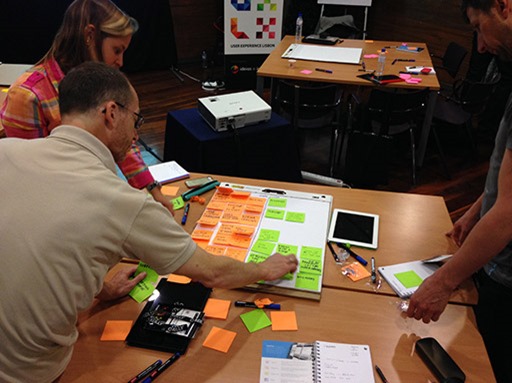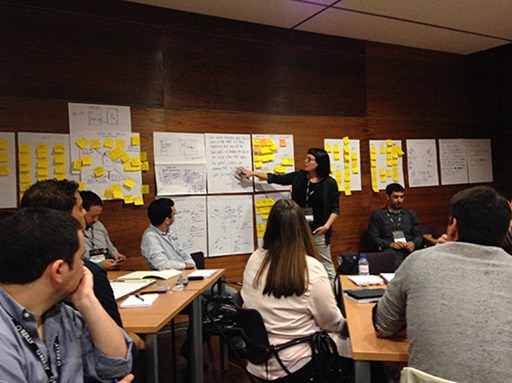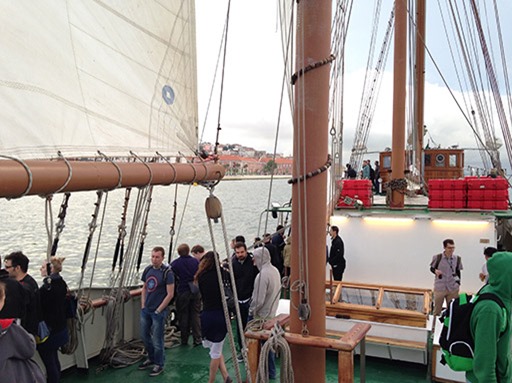Archives
-
Looking Back at UX Lx 2014
The User Experience Lisbon (short: UX Lx) is a three-day conference taking place in Lisbon, Portugal (Lisbon’s abbreviation “Lx” is derived from the former Arabic name al-Lixbûnâ used in the early middle ages, by the way).
The conference consists of two days of hands-on workshops and a day of talks. Featuring internationally renowned speakers, the UX Lx draws attendees from all over the world. According to the organizers 40 countries were represented in this year’s UX Lx 2014 that took place from June 4 to June 6 and marked the third time I attended.
Day 0
The traditional welcome party on the evening before the first day is good way to meet other attendees. Because not all tickets sold are actually for all three days and some attendees attending the first day come to Lisbon in the morning, the party isn’t crowded. And with the very open atmosphere of the UX Lx in general, it doesn’t take much time to somehow get involved in a conversation.
Day 1
Workshop: Designing for Change
Christina Wodtke spoke about the psychology of change, why users resist it and how to introduce changes to a software and its feature set without steamrolling over the existing user base. In the hands-on part, groups worked on designing a new feature to a travel application. It is always interesting when you start working on a common goal with complete strangers, each of which brings a very different background to the table. For me, that’s a very important aspect of the UX Lx.
The first workshop uncovered one general problem of the UX Lx conference, the half-day format of the workshops. Year after year it seems that many speakers usually give full-day workshops at other occasions and strip them down to fit into three hours at UX Lx. At three of four workshops I attended, the speakers ran into time problems and noted something along the lines “usually this workshop is longer…”.
Lightning Talk: From Lo-fi to Hi-fi - A walk-through of prototypes
Péter Polgár presented various types of prototypes and did a solid job overall. The use of a zooming mind map presentation tool felt a bit gimmicky though and didn’t really help the talk.
Workshop: Experts Reviews for Experts
It’s always great to hear a speaker whose experience is measured in decades, not years or even months. Rolf Molich is one of these few. His workshop was well-prepared, perfectly timed and he even brought his own evaluation forms. Molich gave an introduction to “experts reviews”, where UI/UX experts (with enough actual experience in the field) review a user interface. He also presented studies that have shown that these experts reviews can deliver good results (i.e. can find serious usability issues) in comparison to usability tests and are very competitive in terms of manpower and time.
In various exercises we analyzed user interfaces of growing complexity and discussed and prioritized our findings in work groups.
Conference Dinner: Buffalo Grill
During my first visit I didn’t book any of the conference dinners, last year I found out that I missed a great opportunity to talk with other attendees. This year, I again booked all three of them.
The barbecued meat at the Buffalo Grill was really great. The restaurant itself turned out to be a bit loud because of the bare walls, though. And some attendees single-handedly raised the noise-level by being audible across the whole room, causing everybody else to raise their voice. Still, I had some very interesting conversations.
Day 2
Workshop: Collaborative Research
The workshop by Erika Hall mainly dealt with techniques for interviewing (potential) users and how to gather insight from the statements of the users. In the exercises we practiced this by interviewing each other, switching roles along the way.
Interesting how (in my opinion) I really totally sucked at conducting the interview compared to the others in my group, but at the same time how I was much better able to extract the core insights, dividing seemingly related but in fact orthogonal statements. A sign how different the backgrounds of the attendees were. Everybody I talked to during the conference was really smart, yet excelled at different abilities.
Lightning Talk: Fun, Confusion, Fear and Basketball
What a strange title – who, right in their mind, would give a talk such a strange title? Oh wait, it was me.
In my first session in English at an international conference I spoke about my hobby project of writing software for rear projection screens and LED advertising system. The “confusion and fear” part of the title alluded to the usability problems that I ran into while using the software in high-pressure situations in the arena – situations that were notably different from the calm atmosphere of testing the software at home.
My talk about stumbling blocks and lessons learned was well-received and it’s nice when people walk up to you even a day later and tell you how much they liked it.
The slides can be found here: http://www.slideshare.net/RWeigelt/fun-confusion-fear-and-basketball-ux-lx-2014
Workshop: Designing for Discovery with Faceted Navigation
This workshop with Jim Kalbach about faceted navigation started out really promising and I’m sure that the full-day version rocks. I really enjoyed the talk parts and the many examples, starting from early history (even though in the back in may head I knew that the timing was off). The half-day version turned out OK, but exercises had to be cut towards the end.
Conference Dinner: Populi
The restaurant on the second day was in downtown Lisbon; transportation to the Populi was provided via buses, the way back wasn’t a problem either with a Metro station in front of the restaurant. Also a bit loud, but again lots of interesting conversations.
Day 3
The third day of the UX Lx conference featured the following sessions:
Mike Monteiro: How Designers Destroyed the World
A passionate talk about the responsibility towards “the world” that designers have when they design a feature (that e.g. breaks the user’s trust), an advertising campaigns (cigarettes, anyone?) or something else that may do harm.
Kate Rutter: How Designers Can Build a new World
Designers and entrepreneurship – a well-delivered talk that didn’t really catch me, partly because I don’t envision myself to be part of the target audience for this talk.
Russ Unger: Things I've learned from leading UX Designers
Not exactly my area of interest, but very honest presentation. Slides are here: http://de.slideshare.net/runger/ux-lisbon-things-ive-learned-and-am-still-learning-from-leading-ux-designers.
Jason Grigsby: Adaptive Input
Great talk about the challenges of unifying user interfaces to be used by mouse or touch at the same time. The key sentence: Input matters more than screen size. The slides: https://speakerdeck.com/grigs/adaptive-input-uxlx.
Christina Wodtke: The Mechanics of Magic
Christina spoke about the power of games to create emotions, and at the same time warned about the dangers of gamification. The hunt for badges and a place on a leaderboard may initially provide some sort of incentive to use a system. In the end the metrics will either make people game the system – or no longer care. In both cases the original intrinsic motivation is finally killed off, with the end result being highly undesirable.
Bill DeRouchey: History of the Button
I really enjoy everything related to the history of computing in general, and looking back at the history of something as simple as a button is a really worthwhile topic. A talk that explains a (mechanical) button as an “abstraction of movement” definitely hits a certain vibe with me. An inexcusable lapse though was presenting the Mac in 1984 as the starting point of the button in user interfaces (or at least giving the impression on the slides). Not cool.
Jess McMullin: Citizen Experience Design and You!
Well-presented, but didn’t really work for me.
Margot Bloomstein: Content strategy for slow experiences
The talk started out a bit slow (how fitting) before it came to the point and suddenly it all made sense. Increasing the perceived performance of a system is one point. But there are actual use cases for creating deliberately slow experiences that people perceive as thorough and valuable, for example when buying specific equipment (cameras, outdoor clothing).
The slides: http://slideshare.net/mbloomstein/content-strategy-for-slow-experiences-at-uxlx
Steve Baty: (Re)framing - The first step towards innovative ideas
The three days finally took their toll and it seems my mind wandered off during that talk, right now I cannot remember what it was about. I only remember that when the talk was finished, I wondered whether the next talk could keep me awake. Little did I know.
Jared Spool: UX Strategy Means Business
My personal highlight of the day and a strong way to end the day. This was exactly the kind of session for broadening the personal horizon I am looking for when visiting the UX Lx conference.
Robert Sterry blogged about the session, the slides by Jared Spool are available as a PDF file.
Sunset Boat Cruise
Like last year, the weather didn’t like us. But also like last year, at least it stopped raining towards the end. And it was a lot of fun nevertheless.
Conference Dinner: Portugália
The weakest of the three restaurants; not just my personal opinion, but also of others I talked to. When a woman makes a remark about the not exactly huge portion size, you know something went wrong. And many of those who chose the chocolate mousse for dessert simply didn’t get it (no longer available, sorry).
The conversations at the table I sat at weren’t so much about UX, but more about topics ranging from the upcoming FIFA World Cup or Basketball in Germany and Lithuania up to the fall of the iron curtain and how it was experienced by people from different nations. I enjoyed it very much.
Final Thoughts
In a time of virtually endless content on the Internet, it becomes increasingly harder to justify a (physical) visit to a conference. In the case of the UX Lx, it’s not just about the pure content. It’s also about getting inspired (which is much harder viewing a video on a computer screen) and communicating with other attendees. The evening activities give you enough time for longer conversations that go beyond what is possible at the lunch table or during the breaks. And the openness of the attendees makes it really easy.
So will I attend next year? If time permits, yes.


